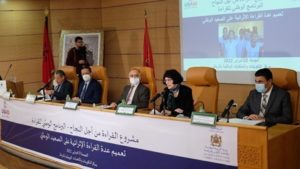1.1 million books distributed to all Moroccan primary schools by USAID National Program for Reading
By Daniel Lynx Bernard
Rabat, Morocco – An effort to rejuvenate reading and writing in the early grades in Morocco is impacting every primary school across the country. To inspire early grade students, trucks full of colorful storybooks traveled around Morocco in March to deliver 1.1 million books to 11,000 public schools to be used by more than 2.5 million students in grades 1 through 4.
Sparking children’s interest in reading at a young age has shown to be a key to lifelong academic success. Unfortunately, primary schools in Morocco lack libraries and textbooks frequently do not engage students.
As part of the Reading for Success–National Program for Reading (RFS-NPR) funded by the U.S. Agency for International Development (USAID/Morocco), Creative Associates, RFS-NPR implementer in Morocco, worked side by side with Morocco’s Ministry of National Education, Preschools and Sports to narrow the gap between developing a passion for reading at an early age and the lack of engaging reading materials in primary schools.
Partners developed Supplementary Reading Material (SRM) kits containing 100 books aimed to promote independent reading. In addition, a teacher’s guide was prepared encouraging teachers to incorporate these materials in fun and engaging ways.
After a successful pilot phase, the Ministry asked NPR to print enough kits to expand the activity throughout the country. At a launch ceremony in Rabat on February 25, Morocco’s Minister of National Education, Preschool and Sports, Chakib Benmoussa, and Director of Curricula, Fouad Chafiqi, thanked USAID for its involvement.

Brooke Isham, Ph.D., USAID Morocco Mission Director, described the National Program for Reading as “a true partnership” between USAID and the Ministry.
“Today’s event aims to support the culture of reading and Arabic literacy in Morocco through expanding the availability and the use of supplemental reading materials from the pilot schools of the National Program for Reading to all Moroccan classrooms,” Isham said. “These materials, most importantly, will help improve reading and writing skills for students while broadening their vocabulary and their imagination.”
Each kit includes 100 storybooks selected from the 3asafeer (which means “birds” in classical Arabic) digital library and adapted to the Moroccan cultural context, ensuring they reflect gender equality, social inclusion, and representation of persons with disabilities. The teacher’s guide explains how to use the materials effectively in classroom activities such as reading in unison, in pairs, or independently, or performing a book as a play, thus encouraging students to connect personally with the stories.
Teachers in the pilot schools found that devoting a 30-minute period each week to reading enrichment created positive anticipation among students. Teachers set up a reading corner in their classrooms where students could choose a book that interested them. Many teachers allowed students to borrow SRM books to enjoy at home. The materials are also available online on the 3asafeer platform, on which teachers can track their progress.
Teachers who participated in the pilot phase recounted that student were enthusiastic to participate in the activity, even volunteering to act out the stories.
“At the beginning, most of the students didn’t have fluency in reading,” said Tahra Ait Ali Brahim, a fourth-grade teacher at Elmouahidine School in Temara, Morocco. “Only two or three sessions after introducing the reading enrichment program, I noticed how students started to love reading, not only the SRM tool kits books, but the normal textbooks and poems, as if they broke the barrier of the fear of reading.”
Shadia Roushdi Yousfi, a fourth-grade teacher at Oulad M’Barek School in Temara, said students came to view the opportunity to read the supplemental reading materials as a treat. Yousfi asks her students to look up words they don’t understand and explain what they liked and disliked about the storybook. “They’re gaining a huge vocabulary that can give them the opportunity to express themselves and to give their opinion,” Yousfi said.
“When students finish all the books, they are eager to read more,” said Faiza Azioui, a second-grade teacher at Oulad M’Barek School in Temara.
The Moroccan government is taking steps to ensure the intervention is sustained after the project concludes. After the launch, the Ministry of Education asked primary school inspectors at the provincial level to train and support teachers in using the teacher’s guide.
The Ministry recommended that schools throughout the country designate a half-hour period each week to using the kits in the classroom; encourage students to borrow the books; and promote use of the digital versions. Follow-up on the effectiveness of implementation is planned at the local and national level.
The supplemental reading material activity is one element of a comprehensive revitalization of Morocco’s approach to promoting reading, writing, and speaking in Arabic under the Reading for Success–National Program for Reading.

